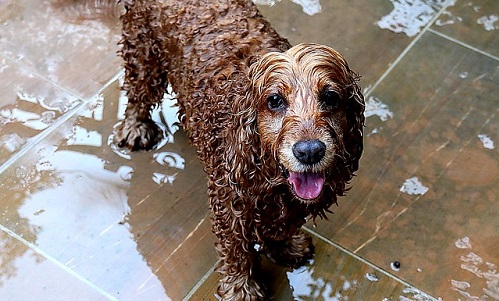We all know of humans who are allergic to dogs – those who experience itching or sneezing around certain breeds. But, what causes this allergy and can dogs be allergic to other dogs as well? The answer is yes. Your four-legged friends can experience allergic reactions around other dogs, similar to their human owners. Although, keep in mind that it’s not the dog itself, it’s any materials or contaminants they may be hosting that are really causing the allergic reaction in another pup. Let’s talk about what to look for if you think your dog is having an allergic reaction, and possible treatment and prevention measures you can take.
Symptoms
If notice your pup acting strangely after a trip to the park or after playing with a new friend in the neighborhood, he could be experiencing an allergic reaction. Signs of an adverse reaction to environmental factors, such as the allergens carried by dogs, include:
Sounds familiar, right? Many of us have personally experienced some of the above symptoms whether from high pollen levels, over-the-counter medicine, mold or even smoke. That should make it easier for you to recognize those signs in your pet and take notice of factors that may have caused them to flair up. Symptoms such as these usually don’t become serious, just be sure to keep an eye on your beloved dog. If you take notice of any of the above symptoms dramatically increasing or becoming worse, he may be experiencing a serious allergic reaction and should be taken to the veterinarian as soon as possible.
Causes of Allergies in Dogs
So, what are those allergens carried by our dogs that can cause allergic reactions in dogs and their human owners? Lots of people think that it’s dog hair that’s giving you those watery eyes, but rather it’s the proteins that develop and hang out in their fur.
- Dander or dead skin
- Saliva
- Urine
Although, it is true that you can be more allergic to certain breeds than others; that goes for both us and our pets. The various breeds of dogs can produce different types or amounts of dander, therefore causing increased or decreased allergic reactions. It shouldn’t be due to the length of hair either, both long and short-haired dogs can produce allergens. It may seem strange to think that your pet can be allergic to its own species, but its treated just like any other substance that’s interrupting their immune system. The external symptoms are caused when the immune system overreacts and tries to fight and destroy the unwanted substance (friendly dog or not!). Canines can even have allergies to food or substances, such as peanut butter or chicken. Dogs with weakened immune systems are even more susceptible to allergies, such as those in poor health or old age.
Treatment
Allergies can be tricky, with a food allergy you can be aware and avoid those foods or any other products that include that ingredient altogether. But, when your dog is having uncomfortable, negative reactions around other dogs, what can you do? There are some small, easy steps you can take to reduce allergens and help to ensure that your pup isn’t itchy after each encounter with another dog during your morning walk. Some changes you can make include:
- Bathing – regular baths for all the pets in your household can help to reduce the build-up of allergens that collect on the carpets and furniture.
- Air purifiers – these can reduce the allergens that become airborne and make their way into your pet’s eyes and lungs.
- Avoid other animals – we know it may be tough, but if another dog is really causing your pup some pain, try to avoid playtime as much as possible. If it’s inevitable, just be sure to give them a bath right away. And try not to allow them on couches and beds that can attract the dander. The allergen can stay collected on our furniture and in the air, which can continue to cause irritation.
Recovery & Prevention
If you realize that your dog is experiencing an allergic reaction to other dogs, be sure to schedule an appointment with your local vet. They may be able to identify other possible allergens or determine steps that you can take to enhance their overall health and immune system. Many dog owners wonder if they should give their pet Benadryl. If you suspect that your pet is having an allergic reaction it’s not recommended to provide treatment at home. Once consulting with your veterinarian, they may provide medications you can administer to reduce the symptoms. Now that you’re aware of this allergy, you can take the appropriate steps to avoid a future incident and keep your pup happy and healthy.
Sources:
“Dander Allergies in Dogs – Symptoms, Causes, Diagnosis, Treatment, Recovery, Management, Cost.” WagWalking, 17 Aug. 2016, Accessed 3 Dec 2018. www.wagwalking.com/condition/dander-allergies.
Geier, Elisabeth GeierElisabeth. “6 Signs Your Dog Is Having an Allergic Reaction.” Rover, 15 June 2018, Accessed 3 Dec 2018.www.rover.com/blog/uk/6-signs-dog-allergic-reaction/.
Ayres, Amy Sinatra. “5 Things You Might Not Know Your Pet Could Be Allergic To.” Vetstreet, Accessed 3 Dec 2018. www.vetstreet.com/our-pet-experts/5-things-that-may-trigger-your-pets-allergies.




